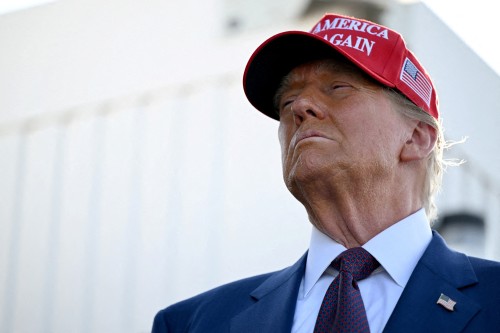By Chuck Mikolajczak
NEW YORK (Reuters) – The U.S. dollar rose to a fresh 2-1/2-month high on Tuesday, continuing its recent ascent on expectations the Federal Reserve will temper its interest rate cut path, while investors positioned ahead of an apparently tight U.S. presidential election.
The greenback has risen for three straight weeks and is on track for its 15th gain in 17 sessions as a run of positive economic data has diminished expectations about the size and speed of rate cuts from the Fed, which has pushed U.S. Treasury yields higher.
The yield on the benchmark 10-year U.S. Treasury note reached 4.222% on Tuesday, its highest since July 26.
Markets are pricing in an 89.6% chance for a cut of 25 basis points at the Fed’s November meeting, with a 10.4% chance of the central bank holding rates steady, according to CME’s FedWatch Tool. The market was completely pricing in a cut of at least 25 bps a month ago, with a 50.4% chance of a 50 bps cut.
“If the data had not been strong in the U.S., certainly had not been strong relative to the rest of the world, there would not have been this divergence between what the Fed is moving towards and what the other central banks are moving towards, which is opposite directions, at least tonally, rhetorically, and that is what is driving the dollar higher,” said Thierry Wizman, global FX and rates strategist at Macquarie in New York.
The dollar index, which measures the greenback against a basket of currencies, including the yen and the euro, rose 0.12% to 104.08, after hitting 104.10, its highest since Aug. 2. The index is up about 3.3% on the month, on pace for its strongest month since April 2022.
Sterling edged down 0.04% to $1.2979.
The upcoming U.S. presidential election also continues to drive currency moves, as market expectations have grown in recent days for a victory by Republican presidential candidate and former President Donald Trump, which would likely bring about inflationary policies like tariffs.
“As Trump’s prospects have done better in winning the election, the market starts to price in more inflation in the U.S. too, because his core policy agenda is associated with more inflation, at least certainly more than you would associate with (Democratic presidential candidate Kamala) Harris’ core policy agenda,” said Wizman.
The euro dipped 0.15% to $1.0798. A flurry of European Central Bank policymakers spoke on Tuesday to warn about the risk of inflation falling below the central bank’s 2% target, signaling a change in their focus after years of excessive price growth.
Against the Japanese yen, the dollar strengthened 0.17% to 151.08 after climbing to 151.19, its highest since July 31.
The Bank of Japan is carefully looking at the upside risks from rising import prices as the yen weakens, Executive Director Takeshi Kato was quoted as saying by Jiji Press on Tuesday.
Japan is set to conduct a general election on Oct. 27. Several recent opinion polls have shown the possibility of the ruling coalition losing its majority in parliament, which could cost premier Shigeru Ishiba his job or force his Liberal Democratic Party to look for an additional coalition partner to stay in power, raising concerns the Bank of Japan could face complications as it attempts to slowly wean the nation off decades of monetary stimulus.
In cryptocurrencies, bitcoin shed 0.49% to $67,392.55.
(Reporting by Chuck Mikolajczak; Editing by Ros Russell and Jonathan Oatis)


